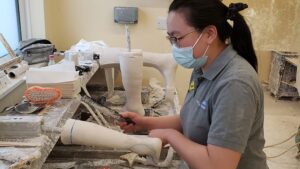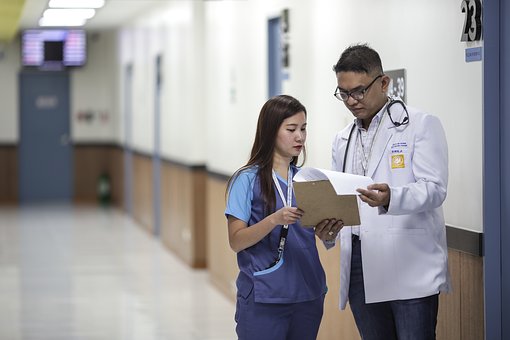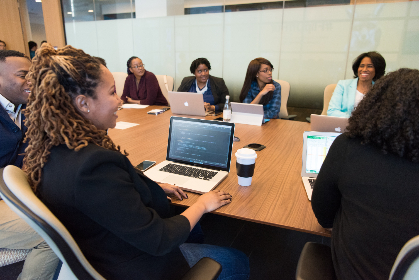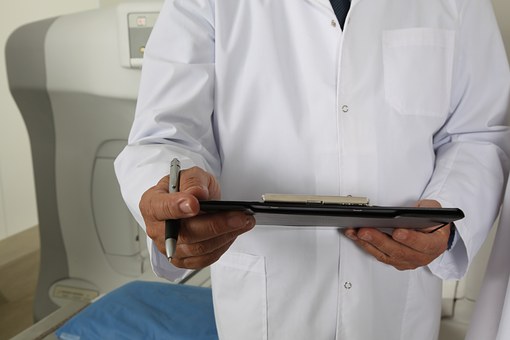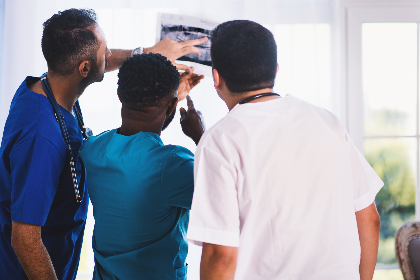While CPHA has the most expertise in supporting students to explore, prepare for, and apply to graduate level professions programs, such as MD/DO, PA, OT, PT, Dental, Optometry, Public Health, and Veterinary Medicine, we also strive to help students learn about additional members of the healthcare team. Keep reading for spotlights on additional health professions, and use our Resources for Exploring page to learn about even more roles!
Additional Health Career Spotlights
This is an accordion element with a series of buttons that open and close related content panels.
Accelerated Nursing Programs
Note: This section contains information for students seeking admission to accelerated nursing programs. If you want to complete a BSN in Nursing as an undergraduate student here at UW-Madison, please visit the UW-Madison School of Nursing website. They have an amazing team of advisors who will support you on your journey to becoming a nurse. We are here to help UW-Madison students and alumni hoping to become nurses through accelerated BSN and direct entry MSN programs.
If you enjoy helping others, are detail oriented, and are a team player, nursing might be a good fit for you. Along with generalized medical training, nurses can also be trained in specific medical departments (surgery, trauma, etc.) and be accredited in specialties such as ambulatory care, pediatrics, etc.
The nursing field has multiple entry points, degree paths, and opportunities for continuing education and advanced certification. Pathways into nursing include:
- Associate degree programs
- Traditional undergraduate BSN
- Accelerated BSN
- Direct Entry MSN
- Advanced Practice Registered Nurse (APRN)
- Doctor of Nursing Practice (DNP)
- Nurse Researchers (PhD)
- Nurse Educators
- Public Health Nurses
For more information about pathways into nursing, visit the American Association of Colleges of Nursing (AACN) Education Pathways page or view this Nursing Degree Comparison pdf from NursingCAS. Find programs by searching the AACN program database.
The following is a general guide for courses you may need to apply to an accelerated nursing program. Requirements vary from school to school. So, it is always necessary to consult the websites of accelerated nursing programs where you know/think you want to apply.
Accelerated Nursing Programs Required Coursework
| Topic | Requirements |
|---|---|
| Math | Many programs require a statistics course. We recommend Statistics 301, Statistics 371, or an introductory statistics course in an alternative field of interest (e.g. Psychology 210). This can be taken in your major department. NOTE: Math 112 is a prerequisite for Chem 103 and Physics 103. In addition, Math 217 or 221 are prerequisites for Physics 201 and 207. |
| General Chemistry | Choose one of the following sequences: Chemistry 108 Chemistry 103-104 |
| Biology | Choose one of the following sequences: Zoology 101-102 Biology 151-152 Biocore: Students must apply to enroll in Biocore. For more information, visit their website. Biocore 381-382 AND 383-384 satisfies Intro to Bio requirements Biocore 485-486 Organismal Biology lecture/lab (Satisfies I/A bio) |
| Microbiology | Choose one of the following sequences: Microbiology 101-102 Microbiology 303-304 |
| Anatomy/Physiology | Physiology (Anat&Phy 335/435 [both include lecture and lab]) Anatomy (Anat&Phy 337 [lecture] & 338 [lab]) |
| Psychology/Human Development | Introductory Psychology: Psych 202 Child Development: HDFS 262 (HDFS 362 prior to Fall 2023) or Psych 460 AND/OR Adult Development: HDFS 263 (HDFS 363 prior to Fall 2023) or Psych 464 |
| English | Many programs require 6 credits of college level English. |
| Other courses | Some programs require coursework in the following areas: Organic Chemistry: Chem 341-342 Genetics 160 Anthropology or Sociology Nutrition Medical terminology CNA certification |
The application process for accelerated nursing programs varies. Some schools use a centralized application called NursingCAS. Other schools have individual applications.
Professional organizations include the American Nurses Association (ANA), the Asian American/Pacific Islander Nurses Association (AAPINA), the Gay and Lesbian Medical Association (GLMA), the National Alaska Native American Indian nurses Association (NANAINA), the National Association of Hispanic Nurses (NAHN), and the National Black Nurses Association (NBNA).
Financial Aid
Below are various financial aid resources to help you plan your finances as you apply to Nursing programs:
- FinAid’s list of Loan Forgiveness programs
- AACN’s Financial Aid resources
- HRSA’s NURSE Corps Scholarship Program
- Sigma Theta Tau’s Scholarship Opportunities
- Johnson & Johnson’s Discover Nursing Scholarship page
- ANF’s Scholarship Program
Learn more about UW-Madison’s Accelerated Bachelor of Science in Nursing Program and reach out to admissions@nursing.wisc.edu with any questions.
Anesthesiologist Assistant

Anesthesiologist Assistant
- Anesthesiologist Assistants work in partnership with anesthesiologists and other medical professionals to care for patients in the operating room under anesthesia.
- Find a school directory on the Association of Anesthesiologist Assistant Education Programs (AAAEP) website under the Members tab. You’ll use the CASAA common application to apply. Learn about the CASAA fee waiver here. Check out the Master of Science (MSA) program at the Medical College of Wisconsin (MCW).
- The professional responsibilities and pay of Anesthesiologist Assistants are similar to those of Certified Registered Nurse Anesthetists (CRNA). However, CRNAs are trained as nurses first and are licensed to practice in more states.
- Visit the American Academy for Anesthesiologist Assistants (AAAA) website for more information about the profession.
- Reach out to Randy DeGreef, a current CAA at UW Health, at RDeGreef@uwhealth.org if you are applying within the next year and need shadowing.
- Reach out to Arianna Berry, CAA, a UW-Madison alum and graduate of the Medical College of Wisconsin MSA program, at aberry@mcw.edu to learn more about the profession and her experience in the master’s program. Use CPHAs guide on informational interviewing to plan for your conversation.
- Watch a recording of the Spring 2024 Anesthesiologist Assistant Information Session to hear from a CAA at UW-Health and two CAA grad students
Athletic Trainer
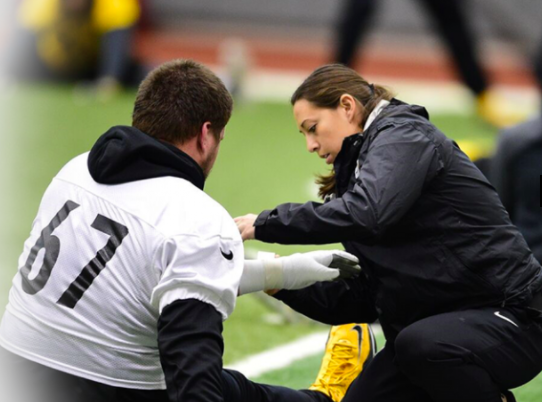
Athletic Trainer
- Athletic Trainers (ATs) are healthcare professionals who collaborate with physicians to provide preventative services, emergency care, clinical diagnosis, therapeutic intervention and rehabilitation of injuries and medical conditions. (Commission on Accreditation of Athletic Training Education)
- Become an athletic trainer by graduating from an accredited master’s program and passing a certification exam
- Work settings include hospitals and clinics, sports & performing arts, educational settings and more
- Athletic trainers may specialize in Injury and Illness Prevention/Wellness Promotion; Examination, Assessment and Diagnosis; Immediate and Emergency Care; Therapeutic Intervention; or Healthcare Administration and Professional Responsibility. Learn more from the National Athletic Trainers’ Association.
- To learn more about UW-Madison’s AT program, visit the MSAT website, follow the program on Instagram, or reach out to Program Director Andrew Winterstein (andrew.winterstein@wisc.edu)
Audiologist
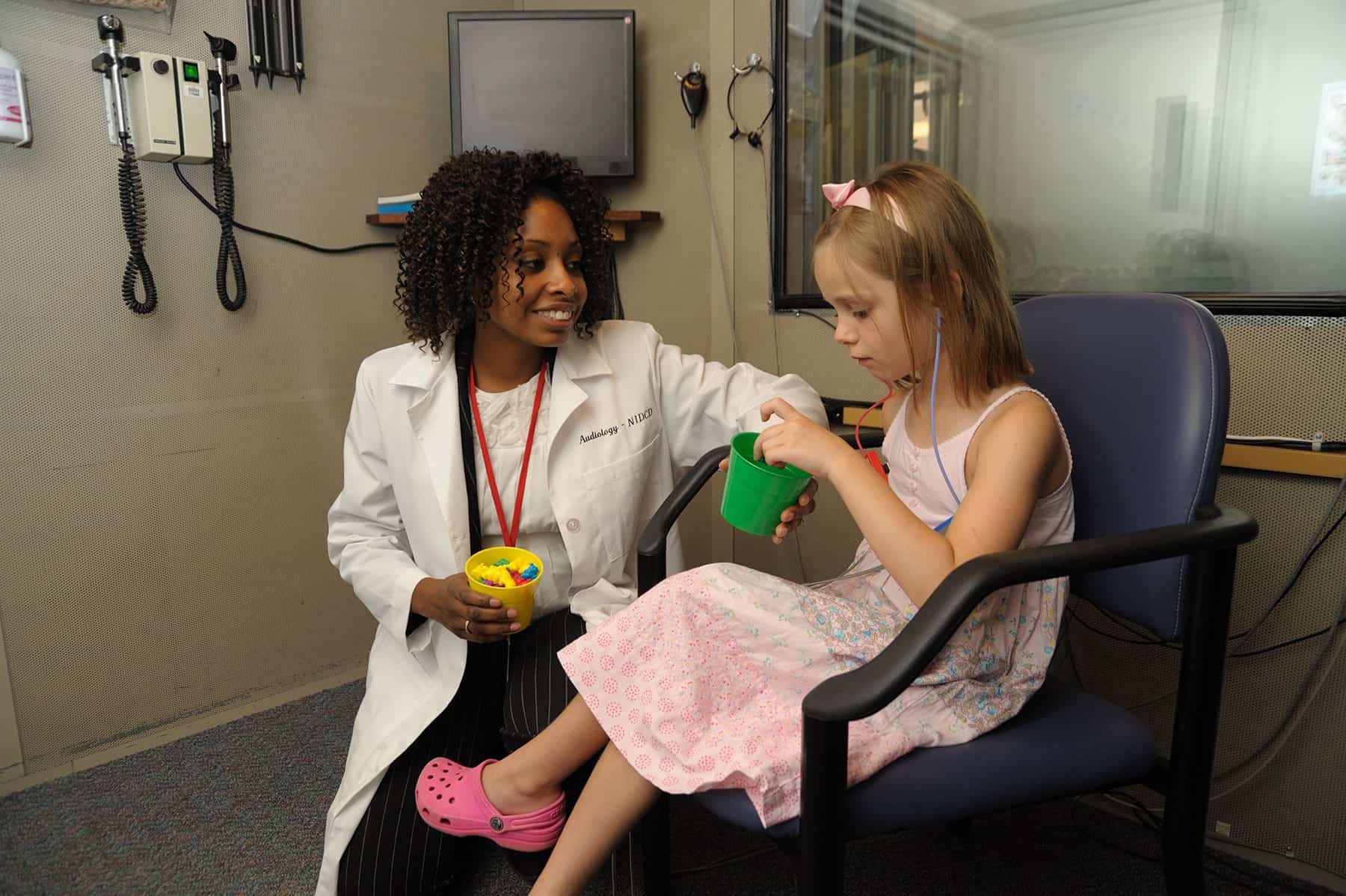
Audiologist
- Audiologists are the primary healthcare professionals who provide services in the prevention, diagnosis, and evidenced-based treatment of hearing and balance disorders for people of all ages.
- Audiologists specialize in identifying and assessing hearing and balance problems, rehabilitating persons with hearing and balance disorders, and preventing hearing loss. To view a helpful infographic about audiology, click here or visit here or here to learn more about the profession.
- Audiologists work in a variety of settings, such as hospitals, clinics, private practice, ENT offices, universities, K-12 schools, government, military, and Veterans’ Administration (VA) hospitals.
- Helpful skills include data analysis, using technology, interacting with patients, and communicating and collaborating with other professionals.
- As an undergraduate, interested students may choose to major in Communication, Sciences and Disorders if the program is offered by their college, but this is not required as long as students complete some prerequisites before applying to graduate school.
- Audiologists must earn a doctoral degree (an AuD) from a program accredited by the Council on Academic Accreditation and get a passing score on a national examination. To explore accredited programs, visit here.
- To get involved with audiology on campus, visit the National Student Speech Language Hearing Association at UW-Madison.
- Watch recordings from the UW Speech and Hearing Clinic Health Symposium put together by current UW AuD students!
- Peter Shireman (pshireman75@gmail.com), a UW-Madison alumni and current audiology student, made a helpful and informative intro to audiology video for interested students. Click here to view.
- Learn more about UW-Madison’s AuD program and reach out to the Department of Communication Sciences and Disorders undergraduate advisor Katie Christenson ( kathleen.christenson@wisc.edu), clinical professor Amy Hartman (amy.hartman@wisc.edu) and grad student Emily Roznowski ( esroznowski@wisc.edu) with questions. Use CPHAs guide on informational interviewing to plan for your conversation.
Biostatistician
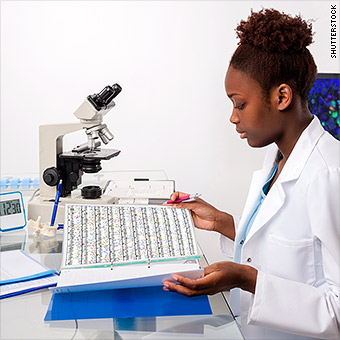
Biostatistician
- Biostatisticians use mathematical methods to analyze biological data. For example, they may help determine a new drug’s effectiveness and risk. Learn more here or from the International Biometric Society.
- Helpful skills include analytical reasoning, organization, drawing conclusions, and computer skills.
- A bachelor’s degree in math or statistics is recommended before applying to a graduate program. Search accredited graduate programs and learn more about UW-Madison’s Department of Biostatistics & Medical Informatics.
- Biostatisticians are employed with the federal government, pharmaceutical companies, academia, and hospitals
- Make an appointment with a Statistics advisor. Or, reach out to Tedward Erker (erker@wisc.edu), a graduate-level statistics professor with an MS in Biometry.
- Connect with Jen Birstler (birstler@wisc.edu), a biostatistician on campus. Use CPHA’s guide on informational interviewing to plan for your conversation.
Cardiovascular Perfusionist

Cardiovascular Perfusionist
- Perfusionists are trained members of surgical teams who temporarily perform the heart’s job during open-heart surgeries and other major procedures by operating circulation equipment such as a heart-lung machine.
- They monitor and manage a patient’s blood flow, body temperature, and other respiratory functions during operations.
- They must have a great knowledge of anatomy and physiology, be detail oriented, and have mental and physical endurance for long surgeries
- Become a Certified Clinical Perfusionist (CPP) by:
- Completing a bachelor’s degree with common prerequisite courses
- Attending an accredited training program in cardiovascular perfusion (1 year certificate or 2 year master’s options available)
- Completing a certain number of cases
- Sitting for an certification exam
- Find a Perfusionist to shadow or (or set up a safe informational interview) HERE!
- Watch a video of a perfusionist in action HERE and learn more HERE and HERE.
Certified Child Life Specialist
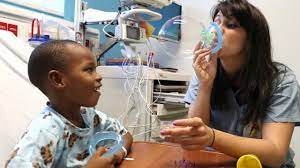
Certified Child Life Specialist
- According to the Association of Child Life Professionals, Certified Child Life Specialists (CCLS) help infants, children, youth and families cope with the stress and uncertainty of acute and chronic illness, injury, trauma, disability, and loss through therapeutic play and other techniques.
- A CCLS also works to ensure that life remains as normal as possible for children in healthcare settings and other challenging environments. To learn more about the profession, visit here.
- Child life specialists provide services in a variety of healthcare settings, including inpatient units, surgery areas, intensive care units, as well as providing services in other settings such as dental offices, community organizations, special needs camps.
- Helpful skills include interpersonal, research, administration and leadership skills and knowledge of techniques and coping mechanisms to help children and families deal with difficult situations.
- In order to become a Certified Child Life Specialist, there are two academic paths a student can take: a student can either earn a Bachelor’s degree in any field of study and take the required child life coursework, or a student can earn a degree from an ACLP-endorsed academic program . To view a list of ACLP-endorsed programs, visit here and learn more about academic and additional requirements here and here.
- Connect with Child Life Program Director at Edgewood College Dr. Katie Glass (kglass@edgewood.edu) to learn more about the ACLP endorsed Master of Science in Child Life Program.
- Reach out to Tara Loether (tara.loether@gmail.com), UW-Madison alumni and current Child Life Specialist at American Family Children’s Hospital or Amanda Lockett (alockett@wisc.edu) a CCLS and current Human Development & Family Studies Graduate Student at UW-Madison to learn more about a career as a Child Life Specialist. Use CPHAs guide on informational interviewing to plan for your conversation.
Chiropractor
Chiropractors provide natural, drugless, nonsurgical health treatments, relying on the body’s inherent recuperative abilities. Chiropractic is based on the principle that spinal joint misalignments interfere with the nervous system and can result in different conditions of diminished health.
The Association of Chiropractic Colleges maintains a list of all of the Chiropractic Medicine programs in the US. For a list of schools, visit the Association of Chiropractic Colleges School Directory. Check out discoverchiropractic.org for a guide to learning about, preparing for, and applying to Doctor of Chiropractic (DC) programs.
Chiropractic schools strongly encourage pre-Chiro students to build experience through shadowing, clinical & community experience, and campus involvement.
The following is a general guide for courses you may need to apply to Doctor of Chiropractic Medicine programs. Requirements vary from school to school. Always consult the websites of programs where you plan to apply. Most Doctor of Chiropractic Medicine programs require 24 semester credits (and 36 quarter credits) in life and/or physical sciences. Most programs require that half of these classes include a lab. The following are courses you can take at UW-Madison in preparation for a Doctor of Chiropractic Medicine program:
Chiropractic Required Coursework
| Topic | Requirements |
|---|---|
| General Chemistry | Complete only one of the following sequences: Chemistry 103-104 (both include a lecture and lab) Chemistry 109 (lecture and lab) |
| Organic Chemistry | Complete only one of the following sequences: Chemistry 341 (lecture) & 342 (lab) Chemistry 343 (lecture), 344 (lab), & 345 (lecture) |
| Biochemistry | Biochemistry 501 (lecture only) Biochemistry 510 (lecture only) |
| Biology | Complete only one of the following sequences: Zoology 101 (lecture) & 102 (lab) Biology 151-152 (both include lecture and lab) Biocore: Students must apply to enroll in Biocore. For more information, visit their website. Biocore 381-382 AND 383-384 satisfies Intro to Bio requirements Biocore 485-486 Organismal Biology lecture/lab (Satisfies I/A bio) |
| Additional Bioscience Courses | Physiology (Anat&Phy 335/435 [both include lecture and lab]) Anatomy (Anat&Phy 337 [lecture] & 338 [lab]) Biomechanics courses Kinesiology courses |
| Physics | Complete only one of the following sequences. All include lecture and lab. Physics 103-104 (without calculus) Physics 201-202 (calculus-based; recommended for Engineering majors) Physics 207-208 (calculus-based; recommended for Life Science majors) |
In addition, Doctor of Chiropractic Medicine programs also recommend (and some require) courses in humanities and social science fields as well. Check the websites of programs where you may apply!
Many programs want you to apply directly through their website. Contact each program directly to determine how to apply.
Professional organizations include:
- The American Chiropractic Association (ACA) promotes education, science/evidence-based practice and charity via the advancement of scholarly research, continuing education and charitable contributions.
- The Association of Chiropractic Colleges (ACC) represents chiropractic medical programs in North America and affiliate member institutions worldwide. The ACC provides support to its member institutions in advancing chiropractic education, in graduating competent professionals, in conducting scholarly research, and in carrying out public service to enhance the health of the public. Their website includes a list of accredited programs, and an overview of requirements for prospective students.
- Other professional organizations include the American Black Chiropractic Association (ABCA), the National Gay and Lesbian Chiropractic Association (NGLCA), and the International Chiropractors Association (ICA).
Cytotechnologist

Cytotechnologist
The above picture is a squamous cell carcinoma, the most common type of cancer of the cervix, caused by human papillomavirus infection (HPV). (UW Cytotechnology webpage)
- Cytotechnologists are medical laboratory professionals who prepare and analyze cellular material under a microscope.
- They most often work in hospital laboratories but can also work in research or in corporate laboratories.
- They also typically work behind the scenes, but may interact with patients if assisting with biopsies.
- Learn more about UW-Madison’s Cytotechnology Program.
Diagnostic Medical Sonography
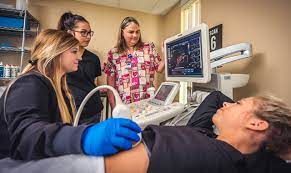
Diagnostic Medical Sonography
- Sonography is a diagnostic medical procedure that uses high frequency sound waves to produce dynamic visual images of organs, tissues, or blood flow inside the body.
- Doctors use scans obtained by a medical sonographer to gain advanced insights into the inner workings of the body while limiting invasive procedures. To learn more about the profession, visit the Society of Diagnostic Medical Sonography and the US Bureau of Labor Statistics and explore professional organizations for echocardiography and vascular sonographers here and here.
- Most diagnostic medical sonographers are employed in hospitals, physicians’ offices or medical and diagnostic laboratories.
- Helpful skills include knowledge of human anatomy, an understanding of physics, hand-eye coordination, being detail-oriented, and having interpersonal skills, physical stamina and technical skills.
- In order to become a diagnostic medical sonographer, students can earn a degree and certification by graduating from a CAAHEP accredited program. To view the list of CAAHEP-endorsed programs, visit here and learn more about the credentialing agency here.
- The School of Diagnostic Medical Sonography at UW-Health is affiliated with Carroll College, Edgewood College, Marian University and UW-Milwaukee, Oshkosh, and LaCrosse to offer a bachelor’s degree in Diagnostic Medical Sonography. For the most up-to-date information on the application requirements and curriculum, visit here.
- Reach out to Mark Ahrens (mahrens@uwhealth.org), program director for the UW-Health program and Michelle Cordio (mcordio@uwhealth.org), manager for the UW-Health program to learn more about how to earn a bachelor’s degree and certification in medical sonography. Use CPHAs guide on informational interviewing to plan for your conversation.
Doula
What is this Job?
- Doulas provide support related to emotional, physical, mental, spiritual, and social well-being to clients going through a range of life transitions.
- Doulas often work with families seeking reproductive support (birth, miscarriage, fertility, abortion, postpartum period, etc.) to provide emotional reassurance, comfort, and information. Learn more about birth and postpartum doulas here and find full-spectrum doula info here.
- In addition to reproductive support, doulas support folks through death/grief (for people and pets), gender transition, and more. Click here to learn more about the support different types of doulas can provide, and read more about death doulas here.
- Doulas do NOT provide medical care. They don’t diagnose, prescribe, or give medical advice.
- Doulas facilitate communication between clients and other medical professionals. They help clients navigate medical systems and ask for what they need.
Helpful Skills
- Interpersonal communication
- Critical thinking
- Leadership
- Advocacy
- Collaboration
Education Pathway
- While laws, regulation, and insurance coverage vary by state and certification isn’t necessary to work as a doula, there are different trainings available to build skills helpful for the profession.
- See below for training examples.
Keep Exploring!
- Reach out to UW-Madison alum, medical student, and doula Ms. Obie Oniah (obie@harambeevillage.org) or contact full-spectrum doula, Ashley Hartman Annis (www.ashleyhartmanannis.com) to learn more about their experience as doulas. Use CPHA’s guide on informational interviewing to plan for your conversations.
- Check out a few local doula groups to learn more about the breadth of transitions doulas help pregnant people and families through: Harambee Village, Roots4Change, Madison Doula Collective, and Seasons of Life.
- Make an appointment with CPHA to talk more about your interests. Learn about other members of the healthcare team such as midwives in our Healthcare Career Spotlight archive.
Environmental Health Practitioner

Environmental Health Practitioner
- Environmental Health Practitioners collect, analyze, and present data on contaminants in air, water, and soil. They work to protect public health by reducing pollution.
- Some might focus on air quality, soil, hazardous and solid waste, noise abatement, or radiation specialties
- Many work in offices or laboratories, but some do fieldwork. They may work with government agencies, consulting firms, or in industry.
- A bachelor’s degree in a science field is recommended. A master’s degree in environmental science can help with career advancement. Some positions will require a certification. Learn more here.
Genetic Counselors
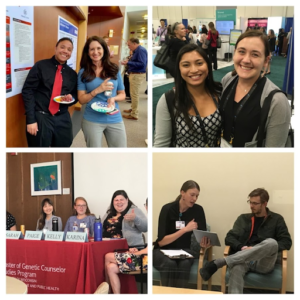 Image caption: UW-Madison Master of Genetic Counselor Studies students are involved in clinical practicums, research, and coursework throughout the 21 month program.
Image caption: UW-Madison Master of Genetic Counselor Studies students are involved in clinical practicums, research, and coursework throughout the 21 month program.
What is this profession?
- Genetic counselors are health professionals with specialized graduate degrees and experience in medical genetics and counseling. The National Society of Genetic Counselors put together this video that helps explain more about the profession.
- Genetic counselors work with members of a healthcare team to help patients and families with or at risk for genetic disorders. They provide education about genetic disorders, analyzing inheritance patterns and risk of recurrence, facilitate genetic testing and interpretation, and provide care coordination for further medical needs.
- They support the patient and the family through counseling, serving as patient advocates, and identifying community, state, and national support services and resources.
Where do genetic counselors work?
- Genetic counselors are employed in many settings such as medical centers, physician offices, health maintenance organizations, clinical research, advocacy organizations, governmental agencies, public health departments and biotechnology companies.
- Those in clinical practice provide education and counseling in areas such as reproductive genetics, infertility and preimplantation genetic diagnosis, pediatric genetics, newborn screening follow-up, cancer genetics, neurogenetics, and cardiovascular genetics.
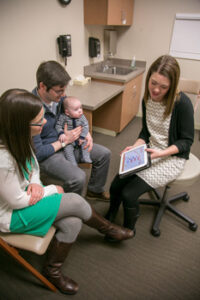
What are helpful skills for this profession?
- Advanced knowledge of medical genetics, statistics, and counseling theory
- Strong interpersonal communication and critical thinking skills
- Passionate advocacy skills
- Strong interprofessional team work
How does someone become a genetic counselor?
- According to the National Society of Genetic Counselors (NSGC), applicants to a graduate school program must have at least a Bachelor’s degree and have completed coursework in genetics, biochemistry, psychology, and statistics. They also need to gain experience related to patient advocacy or counseling, and it is helpful to have exposure to work in research or a healthcare setting.
- The Accreditation Council for Genetic Counseling (ACGC) is the accreditation board for graduate school and they maintain a list of all accredited programs.
- Many programs use a matching process to connect applicants with programs. Students register for The Match, then apply to programs, participate in interviews where they are invited, and then create a secret ranking of programs. Each school also secretly ranks applicants and an algorithm matches students to programs. If you are applying to programs, be sure you know who is using The Match!
- To become a certified genetic counselor, students must obtain a Master’s degree in genetic counseling from an accredited program and then pass the national certification exam offered by the American Board of Genetic Counseling (ABGC) after completing graduate school.
Keep Exploring!
- Consider connecting with a genetic counselor for an informational interview. The National Society of Genetic Counselors (NSGC) lists genetic counselors that are open to student interaction. Do not limit yourself by geography; try to interview genetic counselors in different specialties.
- The UW-Madison Master of Genetic Counselor Studies is a 21-month long program that hosts various information sessions and virtual office hours throughout the year to help prospective applicants learn more about the profession. Several graduates of UW-Madison’s GC program have graciously shared their contact info for further questions: Kendall Annable (kendall.annable@labcorp.com, Prenatal GC), Jessica Bortnova (bortnova.jessica@mayo.edu, Hematopathology GC), and Katie Tobik (Katie.Tobik@atriumhealth.org, Oncology GC).
- The profession is actively working on increasing diversity so as to better serve all communities. Explore the Minority Genetics Professionals Network to learn more about DEI resources and initiatives within the profession.
- Follow @goldenDNA2 on Instagram. “GOLDEN seeks to inform Black students about the career of genetic counseling and engage and support prospective Black genetic counselors.”
- The Master Genetic Counselor Series, a national resource that was created at UW-Madison, features simulated genetic counseling sessions from three different speciality areas: cardiovascular, cancer and prenatal. There are associated resources to help prospective applicants “think like a GC”. The goal of this series is to help emulate live observation, which all training programs recognize as a limited resource and barrier for prospective applicants.
- Discover exciting advances in genetic counseling and current events related to the field at The DNA Exchange, Maps & Genes, and in the My Gene Counsel toolkit.
- Explore podcasts and videos. For example, Katie Lee CGC is a genetic counselor focused on providing proactive applicants with insight about the profession and the process to apply. The podcasts, The Beagle Has Landed and DNA Today, cover a wide range of topics of interest to genetic counselors.
- Make an appointment with CPHA to talk more about your interests.
Healthcare Administrator
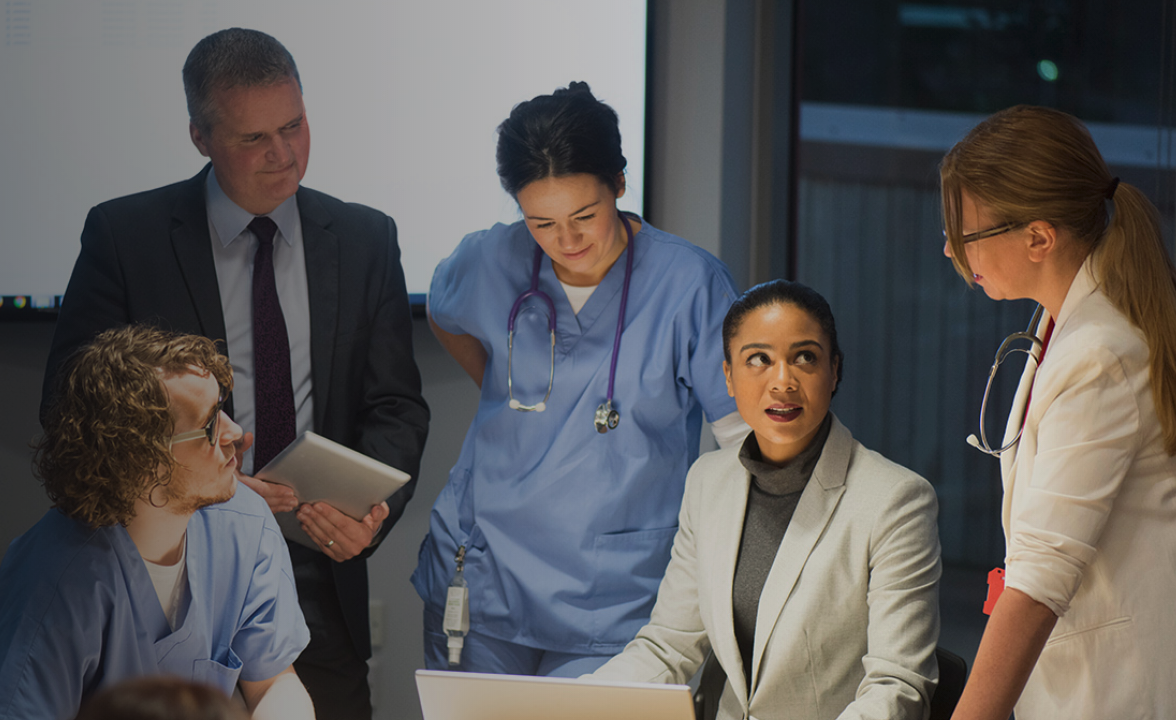
Healthcare Administrator
- Healthcare Administrators are organizational leaders and professionals who are on the business side of healthcare. They can work as medical staff directors, financial managers, emergency preparedness specialists, and in community health, senior care, and more. Learn more about the profession from explorehealthcareers.org and Public Health Online.
- Even though Healthcare Administrators do not directly care for patients, their expertise in communication, strategizing, policy, and finances indirectly benefit patients
- Work environments include large hospital systems to small medical practices. Learn about the variety of paths available here .
- Some positions are available in healthcare administration with a bachelor’s degree, but a master’s degree is recommended for advanced positions. Search accredited master’s programs here.
- Learn more about the healthcare industry from these resources: Modern Healthcare & Healthcare Executive Podcast .
- Consider reaching out to UW-Madison alums and MHA graduate students Marissa Sandkuhler (sandk028@umn.edu) and Louis Monette (monet036@umn.edu ). Both attend the University of Minnesota’s MHA program. Use CPHAs guide on informational interviewing to plan for your conversation.
- Make an appointment with CPHA to further explore this career. Students in the College of Letters & Science can also get great support from Maureen Muldoon, a Career Advisor with SuccessWorks.
Histotechnologist

Histotechnologist
- Histotechnologists prepare thin tissue slices (from patients, animals, or plants) that are later affixed to a slide, stained, and examined under a microscope.
- A pathologist (a specialized physician) reviews the slide and communicates with a patient’s care team to come to a diagnosis.
- Most work in hospitals, clinics, or pathology or research labs.
- Helpful skills include precision, patience, and attention to detail.
- How do you become a histotechnologist? Complete an associates degree (to become a histology technician) or an undergraduate or capstone program in histotechnology (to become a histotechnologist). A national certification exam is required as well. Read more about programs here.
- Learn more about the field from the National Society for Histotechnology and check out a video spotlighting the profession. And of course reach out to CPHA with any questions you have!
Lactation Consultant
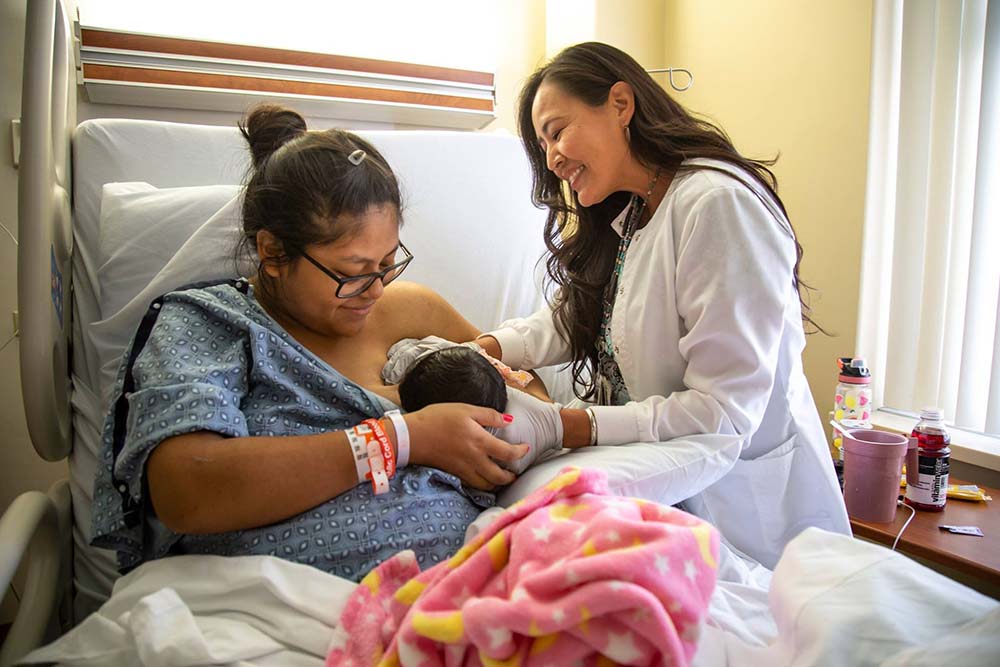
Lactation Consultant
- “Lactation consultants are the primary members of the healthcare team to advocate for breastfeeding families with a focus on preventing, recognizing, and solving breastfeeding difficulties. Most lactation consultants have educational and clinical backgrounds in the health professions or mother-to-mother support.” (Commission on Accreditation of Allied Health Education Programs) To learn more about the profession, visit here.
- Lactation consultants work in a variety of settings including hospitals, public health clinics, maternal and child health services, private medical practices, home health agencies, community and workplace settings, and in private practice.
- Helpful skills include critical thinking skills, interpersonal skills, knowledge of health sciences and public health issues, and patient-care experience.
- Lactation consultants can pursue training through three distinctive pathways: trade school or undergraduate certificate programs, bachelor’s degree programs in nursing, health sciences, or public health with a lactation consultant certificate, or a master’s degree programs in nursing, health sciences, or public health with a lactation consultant certificate.
- All of the above pathways enable aspiring lactation consultants to pursue board-certification through the International Board of Lactation Consultant Examiners (IBLCE) and earn the title of Registered Lactation Consultant (RLC). To learn more about preparing for the IBLCE, visit here.
- To learn more about the lactation field, consider attending an outpatient breastfeeding champion course.
- Listen to a Breastfeeding Medicine Podcast and subscribe to the lactation clinical question of the week.
- Reach out to UW-Madison alumni and lactation consultant Kelly Sijapati (kelly@cygnuslactation.com) to learn more about a career as a lactation consultant. Use CPHAs guide on informational interviewing to plan for your conversation.
Medical Illustrator

Medical Illustrator
- Medical Illustrators are extensively trained in both art and science to create images or animations that depict complex scientific content. Learn more here.
- They may collaborate with physicians or researchers and observe medical or laboratory procedures in the process of creating their illustration
- Most are self-employed; and some may work in hospitals, medical schools, law firms, web/animation firms, or publishing companies
- Artistic skills, attention to detail, and clear communication are required skills
- Become a medical illustrator by taking college level coursework in both science and art. Most medical illustrators attend a master’s level program in medical illustration. Learn more about the four accredited North American programs here.
- Learn about one medical illustrator’s path here.
- And come talk with CPHA to discuss what your next steps might be!
Midwife

- Midwives are healthcare professionals who provide primary OB-GYN care to people from young adult years through menopause. They specialize in work with expectant individuals from before birth through the postpartum period and provide newborn care, birth control, and family planning. They also provide primary care during labor and birth.
- There are three credentialing paths to become a midwife: Certified Nurse Midwife (CNM), Certified Midwife (CM), or a Certified Professional Midwife (CPM). Each has a different range of care they provide, different settings they practice in, and legal status. A nursing degree and a graduate degree are required to become a CNM. Learn more here!
- Practice in hospitals, private homes, birth centers, or offices
- Helpful skills: critical-thinking, compassion, collaboration, advocacy, leadership
- While both midwives and doulas work with mothers from before birth through the postpartum period, and they often work together, their roles differ. Midwives provide medical care for the mother and baby whereas doulas provide nonmedical care such as support related to emotional, physical, and social well being. To learn more about the role of a professional doula, click here.
- Learn more about the Midwifery Model of Care
- Want to explore more? Check out this website, these FAQs, or listen to this podcast!
Orthotist and Prosthetist
What is this job?
Orthotists and prosthetists are practitioners who design, fabricate, and build orthotic and prosthetic devices for their patients. Orthotists create orthopedic braces that externally support a patient’s musculoskeletal system, while prosthetists create custom artificial limbs for patients. Learn more at opcareers.org.
Orthotists and prosthetists have unique expertise in patient assessment as well as device materials and design. Their skills allow their patients to have increased independence and mobility. These practitioners work in a multitude of settings, some of which are veteran affairs, rehabilitation, and long-term care facilities, along with hospitals and patients’ homes.
What are the skill sets/education needed for this job?
(1) Complete an undergraduate degree and take additional pre-req classes. Some programs (ex. Loma Linda University) offer entry-level master’s degrees in orthotics. This does not require a bachelor’s degree, but it does require the completion of significant undergraduate coursework.
(2) Complete a master’s degree program,
(3) Complete a residency in orthotics, prosthetics, or both.
(4) Pass a certification exam in orthotics, prosthetics, or both from the American Board for Certification in Orthotics, Prosthetics and Pedorthics (ABC), the Board of Certification/Accreditation, International (BOC), or both.
Helpful Skills: Communication skills, detail oriented, patience, problem-solving skills, physical dexterity, physical stamina, organizational skills
Want to learn more?
Connect with Kimberly Gorbutt (KGorbutt@uwhealth.org), CPO, a Certified Prosthetist Orthotist at UW Health to learn more about the profession. Use CPHAs guide on informational interviewing to plan for your conversations.
Watch this short video from the American Academy of Orthotists and Prosthetists to learn more about Orthotists and Prosthetists!
Sources:
https://explorehealthcareers.org/career/orthotics-prosthetics/orthotist-and-prosthetist/
https://www.abcop.org/individual-certification/get-certified/orthotist-prosthetist/overview
https://www.opcareers.org/professionals/practitioners/
https://www.opcareers.org/faq/
https://www.caahep.org/Students/Program-Info/Orthotist-Prosthetist.aspx
https://www.bls.gov/ooh/healthcare/orthotists-and-prosthetists.htm
https://www.opcareers.org/talk_to_professional/
Pathologist Assistant

Pathologist Assistant
- Are you fascinated by anatomy? Are you detail oriented? Organized? Compassionate? Do you want to have a “behind the scenes” impact on patients?
- Pathologist Assistants examine and prepare tissue and surgical specimens submitted to a laboratory. They work under the supervision of a Pathologist who will make an ultimate diagnosis.
- Complete a two year Pathologist Assistant master’s program before taking a certification exam. Learn more here!
- Work environments include hospitals, pathology labs, reference labs, forensic labs, morgues and academic settings.
- Learn more here and here! And, read about a day in the life of a Pathologists’ Assistant here.
Pharmacist
Note: We also encourage you to connect directly with staff at UW’s Pharmacy program for the best possible guidance.
According to the American Pharmacists Association (APhA), pharmacy is practiced in a wide range of settings: community pharmacies, hospitals, long term care facilities, the pharmaceutical industry, mail service, managed care, and government. Pharmacists are an increasingly important piece of the healthcare puzzle, as more pharmacists are counseling patients in planning therapy regimens. Learn more about Pharmacy careers at pharmacyforme.org.
Pharmacy schools strongly encourage pre-pharm students to gain experience in clinical settings and to demonstrate their commitment to helping others through shadowing, clinical & community experience, and campus involvement.
For a school directory, visit the American Association of Colleges of Pharmacy (AACP) School Locator or the PharmCAS School Directory.
The following is a general guide for courses you may need to apply to pharmacy school. Requirements vary from school to school. So, it is always necessary to consult the websites of pharmacy schools where you know/think you want to apply. Some pharmacy programs do not require applicants to complete a bachelor’s degree, including the UW-Madison School of Pharmacy. However, they all require different prerequisite courses that applicants must complete at a college or university.
Pharmacy Required Coursework
| Topic | Requirements |
|---|---|
| Math | Most pharmacy schools require at least one semester of calculus. This requirement can be met by taking Math 211 OR Math 221 OR Math 171/217. Most programs also require at least one semester of statistics. This course can be taken in your major department. NOTE: Math 112 is a prerequisite for Chem 103 and Physics 103. In addition, Math 217 or 221 are prerequisites for Physics 201 and 207. |
| General Chemistry | Choose one of the following sequences: Chemistry 103-104 Chemistry 109 |
| Organic Chemistry | Chem 343: Introductory Organic Chemistry Chem 345: Intermediate Organic Chemistry Chem 344: Organic Chemistry Lab |
| Biology | Choose one of these two sequences: Zoology 101-102 + Additional bio-science course Options include: Genetics, Microbiology, Cell Biology, Immunology Note: you may need to do an additional bio-science course with lab Biology 151-152 Biocore: Students must apply to enroll in Biocore. For more information, visit their website. Biocore 381-382 AND 383-384 satisfies Intro to Bio requirements Biocore 485-486 Organismal Biology lecture/lab (Satisfies I/A bio) |
| English/Public Speaking | Most pharmacy schools require 6 credits of English, Literature, or Public Speaking. |
| Physics | Choose one of the following sequences: Physics 103-104 (algebra-based) Physics 201-202 (calculus-based; recommended for Engineering majors) Physics 207-208 (calculus-based; recommended for Life Science majors) |
| Other Coursework | (Not required by all programs) Biochemistry Microbiology Microeconomics Public Speaking Social Science Psychology |
Most schools use a centralized application called PharmCAS, which opens in early July.
Professional Organizations
- The American Pharmacists Association (APhA) is the largest national professional organization for pharmacists, pharmaceutical scientists, pharmacy students, and pharmacy technicians. The APA supports pharmacists in their work and advocates on behalf of the profession.
- The American Association of Colleges of Pharmacy (AACP) represents all of the accredited pharmacy programs in the United States. It works to enhance pharmacy education, research, and practice/ It also administers PharmCAS, the common application for pharmacy programs.
- Other professional organizations include Association of Black Health-systems Pharmacists (ABHP) and the Minority Women Pharmacists Association (MWPA).
Financial Aid
Below are various financial aid resources to help you plan your finances as you apply to Pharmacy programs:
- FinAid’s list of Loan Forgiveness programs
- APhA’s Student Scholarship Program
- AACP’s Financial Aid and Scholarships page
- Pharmacy Times’ Top Scholarships page
Podiatrist
According to the APMA, a podiatrist is a doctor of podiatric medicine (DPM), also known as a podiatric physician or surgeon. Podiatrists diagnose and treat conditions of the foot, ankle, and related structures of the leg. Podiatrists can specialize in many fields, including surgery, sports medicine, wound care, pediatrics (children), and diabetic care.
The following is a general guide for courses you may need to apply to Doctor of Podiatric Medicine programs. Requirements vary from school to school. Always consult the websites of programs where you plan to apply.
Podiatry Required Coursework
| Topic | Requirements |
|---|---|
| Math | Some podiatry schools require math and/or statistics. For Statistics, we recommend Statistics 301, Statistics 371, or an introductory statistics course in your major department. NOTE: Math 112 is a prerequisite for Chem 103 and Physics 103. In addition, Math 217 or 221 are prerequisites for Physics 201 and 207. |
| General Chemistry | Choose one of the following sequences: Chemistry 103-104 Chemistry 109 |
| Organic Chemistry | Chem 343 Introductory Organic Chemistry Chem 344 Introductory Organic Chemistry Lab Chem 345 Intermediate Organic Chemistry |
| Biochemistry | (Required for the MCAT) Choose one of the following sequences: Biochemistry 501 Biochemistry 507-508 |
| Biological Science | Choose one of the following sequences: Zoology 101-102 + Additional bio-science course Options include: Genetics, Microbiology, Cell Biology, Immunology, Physiology, Anatomy Note: you may need to do an additional bio-science course with lab Biology 151-152 Biocore: Students must apply to enroll in Biocore. For more information, visit their website. Biocore 381-382 Evolution, Ecology and Genetics lecture/lab Biocore 383-384 Cellular Biology lecture/lab Biocore 485-486 Organismal Biology lecture/lab Biocore 587 Biological Interactions |
| Physics | Choose one of the following sequences: Physics 103-104 (without calculus) Physics 201-202 (calculus-based; recommended for Engineering majors) Physics 207-208 (calculus-based; recommended for Life Science majors) |
| Behavioral Sciences | (Required for the MCAT) Introductory Psychology: Psych 202 Introductory Sociology, options include: Sociology 120, 125, 134, 138, 140, or 170 Gender & Women’s Studies 103 |
| English | Most podiatry schools require at least 6 credits of English or literature, with an emphasis on composition. |
Podiatry schools strongly encourage pre-Podiatry students to gain experience in clinical settings and to demonstrate their commitment to helping others through shadowing, clinical & community experience, and campus involvement.
For a list of Podiatric Medical Programs, visit the American Association of Colleges of Podiatric Medicine.
Most podiatry programs require the MCAT.
Professional Organizations
The American Podiatric Medical Association (APMA) is the professional organization for Podiatrists in the US. It promotes foot and ankle health, supports professional education, and advocates on behalf of the profession.
The American Association of Colleges of Podiatric Medicine (AACPM) accredits and represents all of the US colleges of podiatric medicine. The AACPM also runs a national mentoring network for pre-health students interested in podiatric medicine, administers the common application for podiatry programs, and facilitates residency programs for graduates.
Other professional organizations include the American Association for Women Podiatrists (AAWP) and the National Podiatric Medical Association (NPMA).
Financial Aid
Below are various financial aid resources to help you plan your finances as you apply to Podiatry programs:
- FinAid’s list of Loan Forgiveness programs
- The APMA Educational Foundation Scholarship Fund
- The AACPM’s Scholarship and Loan Forgiveness Programs page
- The American Association for Women Podiatrists Founders Scholarship
Registered Dietitian Nutritionist

Registered Dietitian Nutritionist (RDN)
- Food and nutrition professionals specializing in the promotion of a healthy lifestyle and treatment of disease through the integration of biochemical, physiological, social, and managerial concepts within the science and art of food and nutrition.
- Work in hospitals, clinics, schools, nursing homes, athletics, research, industry, and public health
- Strong written and verbal communication skills, counseling and active listening skills, and a science and disease prevention interest
- Become registered by (1) completing required coursework (2) earning a bachelor’s or master’s degree (master’s degree required by 2024) (3) completing a dietetic internship (4) passing a national exam
- The term “nutritionist” is not synonymous with RDN, the RDN credential signifies completion of the credentialing pathway listed above.
- Learn about the work Diversify Dietetics is doing to create community around increasing racial and ethnic representation in the field.
- Learn more about UW-Madison’s Didactic Program in Dietetics.
- Make an appointment with Sarah Golla, Advisor in the Department of Nutritional Sciences to learn more.
Respiratory Therapist
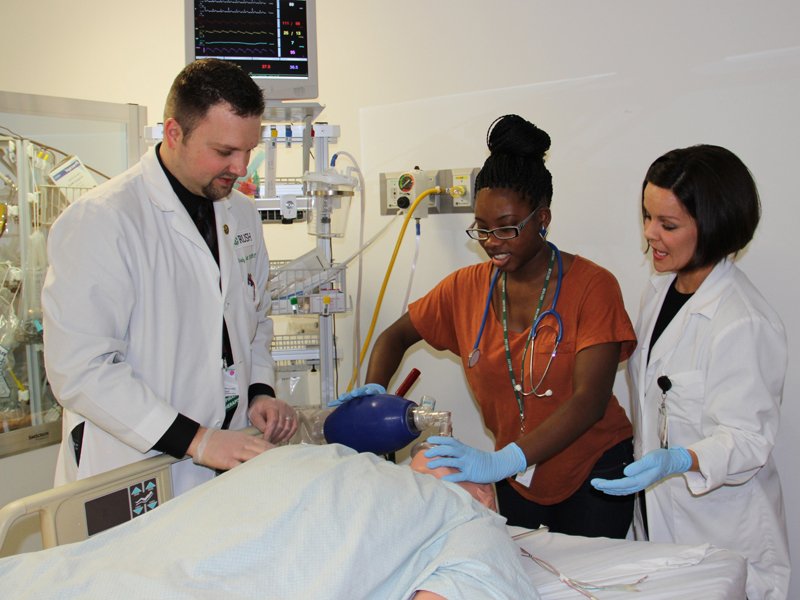
Respiratory Therapist
- “Respiratory Therapy is a specialized healthcare field where practitioners are trained in pulmonary medicine in order to work therapeutically with people suffering from pulmonary disease.” (American Association for Respiratory Care)
- Respiratory therapists are responsible for conducting diagnostic tests for persons with breathing disorders and recommending treatment methods, interviewing patients and doing chest physical exams, and responding to Code Blue or other urgent calls for care. To learn more about the profession, visit here and read some interesting articles about respiratory therapists’ outreach efforts, roles during the Covid-19 pandemic here and here, and here to learn about the urgent need for more respiratory therapists.
- Respiratory therapists work in almost all healthcare career settings, including, but not limited to hospitals, intensive care units, sleep laboratories, pediatric units, asthma education programs, and case management programs.
- Helpful skills include knowledge of the scientific principles underlying cardiopulmonary physiology and pathophysiology, critical thinking, patient/environment assessment skills and evidence-based clinical practice guidelines.
- Respiratory therapists must have a minimum of an associate degree from an accredited respiratory therapy education program. However, many students get a bachelor’s degree and some enter the profession with a graduate degree if they wish to pursue leadership roles.
- After graduation, respiratory therapists are eligible to take two national examinations to earn the Registered Respiratory Therapist credential.
- To inquire about job shadowing opportunities at Rush University, email Priscilla Alvarez (Priscilla_Alvarez@rush.edu) or email Paula Breihan (pbreihan@uwhealth.org) to inquire about job shadowing opportunities at UW Health.
- Reach out to admission specialist Shelley Jackson (Shelley_Jackson@rush.edu) or faculty Ellen Becker (Ellen_Becker@rush.edu) with Rush University’s MS in Respiratory Care to learn more about their program.
- Contact alumni Sarah Brundidge (sarah.brundidge@gmail.com) to learn more about a career as a respiratory therapist. Use CPHA’s guide to informational interviewing to prepare for the conversation.
Social Worker

Social Worker
- Social work is “a profession devoted to helping people function the best they can in their environment” by providing individuals with the necessary tools and resources to cope with problems in their everyday lives. Learn more about the profession here or at the National Association of Social Workers website.
- The three types of social work practices are: Micro-level practice (social workers work directly with clients and help them cope with particular situations, Mezzo-level practice (social workers work with groups of people rather than with a single person), and Macro-level practice (social workers establish social change on a larger scale which is achieved by organizing, establishing policy change, and serving an administrative role).
- Social workers are found in every facet of community life, including schools, hospitals, mental health clinics, senior centers, elected offices, private practices, prisons, military, corporations, and in numerous public and private agencies.
- Helpful skills include interpersonal skills, problem solving, understanding of human development and behavior, and the ability to help people of all backgrounds overcome challenges.
- A bachelor’s degree in social work (BSW) is required for any entry level position(s). In order to become a licensed clinical social worker, a person must get a master of social work (MSW), complete two years of post-master’s experience in a supervised clinical setting, and be licensed in the state in which they practice. To explore accredited programs, visit here.
- Learn more about UW-Madison’s MSW program and reach out to Cindy Waldeck (waldeck2@wisc.edu ) with questions or to get connected to a current student.
- Watch the Exploring Careers in Social Work Info Session from this Spring’s Health Professions Expo.
- Reach out to Laura Bradley (laurasbradley@gmail.com) or Bethany Doherty (bethanydoherty1@gmail.com), both alums and current medical social workers. Use CPHAs guide on informational interviewing to plan for your conversation.
Speech-Language Pathologist
Speech-Language Pathologist
- Speech-language pathologists work with patients seeking treatment in areas of speech, vocal disorders, communication, and swallowing.
- They develop long-term relationships with kids and adults.
- They often work in schools, clinics, nursing homes, or hospitals.
- A graduate degree in Speech Language Pathology is required. Check out the MS in Speech-Language Pathology at UW-Madison.
- Make an appointment with CPHA or see Katie Christenson, UW-Madison Undergraduate Advisor for Communication Sciences and Disorders, for more information.

